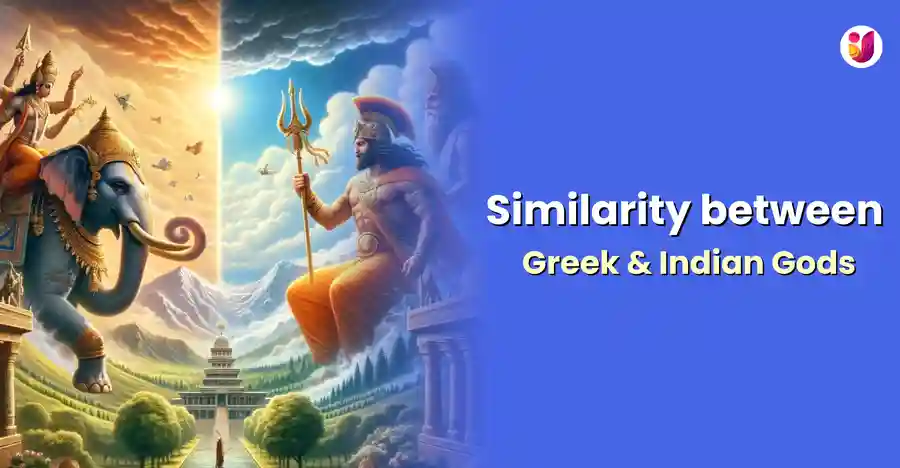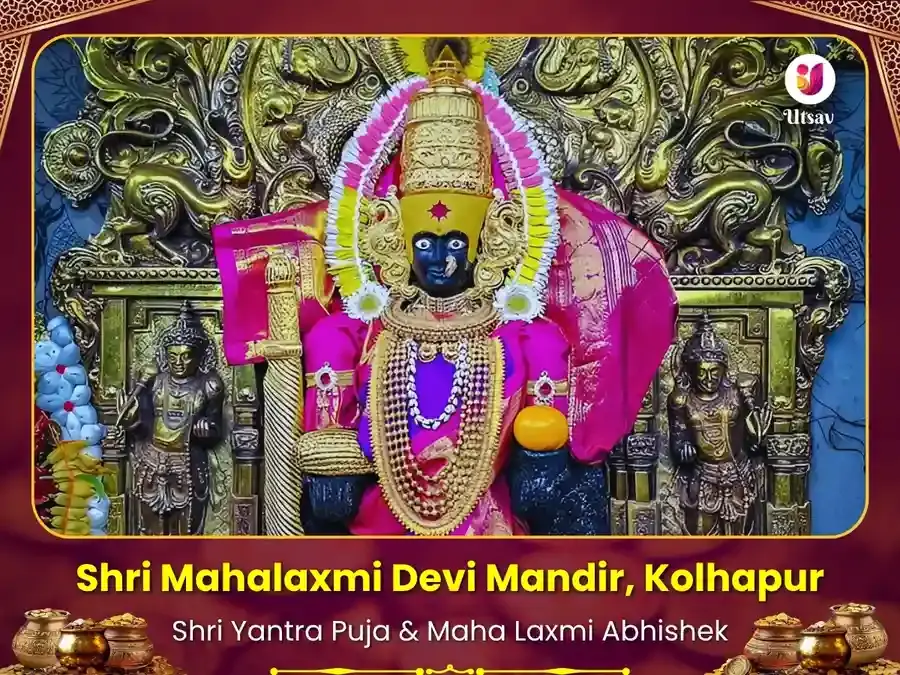Similarity between Greek Gods & Indian Gods
Sat - Mar 01, 2025
5 min read
Share
The Mythologies of Ancient civilizations often have bizarre stories revealing deep connections between human religion and spirituality. Among all the mythologies, Indians (Sanatan) and Greeks are the most complex and influential religions. Despite living in a very different region, they have a remarkable similarity in their gods, cosmology, and mythologies. In this blog, we will explore the similarities between Greek Gods and Indian Gods.
1. Supreme Deities: Zeus and Indra
Zeus is the king of Gods in Greek mythology. He is regarded as the God of sky, lightning, and thunder. Zeus is also referred to as the father of all humans and gods. Similarly in Hindu mythology, Indra is the Hindu god of thunder, war, and rain. He is also known as the king of gods.
Common traits:
Indra and Zeus share many common traits as both are referred to as the king of gods in their respective mythologies, having sky, thunder, and lightning as their primary weapons, and they are also considered the supreme deity. Their depictions portray them with dominance over other Gods.
2. The God of the Underworld: Hades and Yama
Hades is a prominent figure in Greek mythology and is well known as the God of Death and the Underworld. Hades is also known as the ruler of the realm of the dead. Similarly in Hindu mythology, Yama holds a feared significance and is referred to as the God of Death. Yama navigates the souls after death, meaning the afterlife.
Common traits:
In Hindu mythology, Yama holds the same importance among Gods as the Greek God Hades holds. They have many common traits such as they both were first to have died, and both work towards guiding the souls after death. They both are feared significantly in their mythologies.
3. The Goddess of Wisdom: Athena and Saraswati
In Greek mythology, Athena is the Greek goddess of war, wisdom, and arts. She also is the goddess of Athens. Athena is well known for her strategic knowledge of warfare and heroic endeavor. In Hindu mythology, a deity holds the same amount of knowledge and wisdom known as Saraswati. She is known to bring wisdom, creativity, and education wherever she goes. Many people celebrate the festival Vasant Panchami in her honor.
Common Traits:
Saraswati and Athena are both goddesses related to wisdom and knowledge. Athena is known to be the Greek Goddess of war and wisdom whereas Saraswati is a Hindu Goddess of music, education, and creativity. Both the deities are unique yet similar in their ways. Both the deities are believed to possess the power of wisdom.
4. The God of War: Ares and Kartikeya
Ares is known as the Greek God of courage and war. He was the son of Zeus, and he represented war brutality including slaughter. Ares is also referred to as the father of Amazons, which is a tribe of warrior females. Similar to Hindu mythology, there is the God Kartikeya who is the son of Shiva and Parvati. Kartikeya is a warrior god often described as the protector of the Devas.
Common Traits:
Both gods Ares and Kartikeya are related to conflict and war. They are known for their courage and bravery on the battlefield. Ares is often known as a fearless and fierce warrior, whereas Kartikeya is known for his military powers and valor. Both gods are associated with youthful vitality and energy.

5. The Trickster Gods: Hermes and Narada
Hermes is a Greek Messenger of God carrying messages between the mortals and the gods. He is also the god of commerce and wealth. Narada is a divine messenger and sage of the Hindu mythology. He is often described as ascetic with a musical instrument, the veena.
Common Traits:
Hermes and Narada are two distinct gods from different mythologies, Greek and Hindu mythology respectively. Besides their differences, they have many common traits. They are the messengers of god and are depicted with wings. They have trickster qualities as well and they often use their witty nature to achieve their goals.
6. The Goddess of Love and Beauty: Aphrodite and Lakshmi
Aphrodite is the Greek goddess of love, pleasure, beauty, and desire. She was born from the sea and the rose is the sacred flower of aphrodite. Similar to her, there is a Hindu Goddess named Lakshmi who is known for bringing prosperity and good fortune along with wealth and beauty. Lakshmi is believed to have come from Samudra Manthan during the making of the universe.
Common Traits:
Aphrodite and Lakshmi are goddesses of different mythologies namely Greek and Hindu. Both of them are associated with charm, elegance, and beauty. Another similarity is that both of them embody feminine power and are known for their influence and strength.
7. The Sun Gods: Helios and Surya
Helios is the Greek god of light, sun, and warmth. He is often referred to as a handsome god with a radiant aura. Helios brings light to the earth and illuminates the day. Similarly, in Hindu mythology, there is a god named Surya God who is the son of Kashyapa. Surya is also called the source of life because he provides sunlight and heat necessary for survival.
Common Traits:
Both helios and Surya are associated with warmth, light, and sun. They are the gods of light who bring light to the world banishing darkness. Both gods are associated with maintaining cosmic order, making sure that cycles of nature are moving promptly. Another similarity is that they both are associated with fire, which symbolizes their direct connection with light, heat, and energy.
8. The Destroyers: Hades and Shiva
Previously Hades was compared to Yama ( the death God) but he also shares many similarities with Lord Shiva who is the God of destruction and transformation. Hades and Shiva both have fierce and fearsome natures. Both have consorts ( Persephone for Hades and Parvati for Shiva) who bring balance to their Nature.
Common Traits:
Both the Gods rule over the realms connected with the end of life- Shiva, the God of destruction and rebirth, while Hades is the God of Death.
Share
Offer Puja to Ganeshji
🪔
Dhanteras & Budh Aditya Yog Special
Dhanteras & Budh Aditya Yog Special Abhishek Naivedya Seva Mahalaxmi Kolhapur
Mahalaxmi Temple, Kolhapur
Sat - Oct 18, 2025 - Dhanteras
5.7k+ Devotees